
|
FreeComputerBooks.com
Links to Free Computer, Mathematics, Technical Books all over the World
|
|
- Title: Exploratory Programming for the Arts and Humanities
- Author(s) Nick Montfort
- Publisher: The MIT Press; 2nd edition (May 18, 2021)
- License(s): CC BY-NC-SA
- Hardcover: 384 pages
- eBook: HTML, PDF, ePub, Kindle, etc.
- Language: English
- ISBN-10: 0262044609
- ISBN-13: 978-0262044608
- Share This:

|
This book introduces programming to readers involved with the arts and humanities; there are no prerequisites, and no previous knowledge of programming is assumed. Nick Montfort reveals programming to be not merely a technical exercise within given constraints but a tool for sketching, brainstorming, and inquiry.
He emphasizes programming's exploratory potential -- its facility to create new kinds of artworks and to probe data for new ideas. The book is designed to be read alongside the computer, allowing readers to program while making their way through the chapters.
It offers practical exercises in writing and modifying code and outlines "free projects" that allow learners to pursue their own interests.
It is also an astute, gentle, and reflective guide to coding. Through carefully chosen exercises, Montfort shows artists and humanists how to create and explore text and images, and demystifies how to make a computer do something new.
About the Authors- Nick Montfort is Professor of Digital Media in Comparative Media Studies/Writing at MIT.

- Exploratory Programming for the Arts and Humanities (Nick Montfort)
- The Mirror Site (1) - HTML
- The Book Homepage
-
 AI Art: Machine Visions and Warped Dreams (Joanna Zylinska)
AI Art: Machine Visions and Warped Dreams (Joanna Zylinska)
The book critically examines artworks that use AI, be it in the form of visual style transfer, algorithmic experiment or critical commentary. It also engages with their predecessors, including robotic art and net art.
-
 Modeling Creativity - Case Studies in Arts (Tom De Smedt)
Modeling Creativity - Case Studies in Arts (Tom De Smedt)
This book is to model creativity using computational approaches in Python. The aim is to construct computer models that exhibit creativity in an artistic context, that is, that are capable of generating or evaluating an artwork (visual or linguistic), etc.
-
 Computational Formalism: Art History and Machine Learning
Computational Formalism: Art History and Machine Learning
How the use of machine learning to analyze art images has revived formalism in art history, presenting a golden opportunity for art historians and computer scientists to learn from one another.
-
 Programming Fundamentals - A Modular Structured Approach
Programming Fundamentals - A Modular Structured Approach
This book is an introduction to computer programming using any of a variety of programming languages, including C++, C#, Java, JavaScript, Python, and Swift, for writing programmes, and to solid, fundamental programming principles.
-
 A Practical Theory of Programming (Eric C.R. Hehner)
A Practical Theory of Programming (Eric C.R. Hehner)
This book explores aspects of programming that are amenable to mathematical proof. The author describes a programming theory which is much simpler and more comprehensive than the current theories to date.
-
 Learn Programming: Tour Through the Programming Jungle
Learn Programming: Tour Through the Programming Jungle
This book is aimed at readers who are interested in software development but have very little to no prior experience. The book focuses on teaching the core principles around software development.
-
 Your First Year in Code: For New and Aspiring Developers
Your First Year in Code: For New and Aspiring Developers
Starting a career in programming can be intimidating. This book can help, with practical advice on topics like code reviews, resume writing, fitting in, ethics, and finding your dream job.
-
 Patterns for Beginning Programmers (David Bernstein)
Patterns for Beginning Programmers (David Bernstein)
Programming patterns are solutions to problems that require the creation of a small fragment of code that will be part of a larger program. Hence, this book is about teaching you how to write such fragments of code.
-
 Structure and Interpretation of Computer Programs using JavaScript
Structure and Interpretation of Computer Programs using JavaScript
This book introduces the reader to central ideas of computation by establishing a series of mental models for computation. It has had a dramatic impact on computer science curricula over the past decades. Examples are implemented using the JavaScript.
-
 How to Design Programs: An Introduction to Programming
How to Design Programs: An Introduction to Programming
This introduction to programming places computer science at the core of a liberal arts education. Unlike other introductory books, it focuses on the program design process, presenting program design guidelines.
-
 The Recursive Book of Recursion (Al Sweigart)
The Recursive Book of Recursion (Al Sweigart)
Recursion has an intimidating reputation. This book uses Python and JavaScript examples to teach the basics of recursion, exposing the ways that it's often poorly taught and clarifying the fundamental principles of all recursive algorithms.
-
 Elements of Programming (Alexander Stepanov, et al)
Elements of Programming (Alexander Stepanov, et al)
The book shows that algorithms implemented in a real programming language, such as C++, can operate in the most general mathematical setting. For example, the fast exponentiation algorithm is defined to work with any associative operation.





